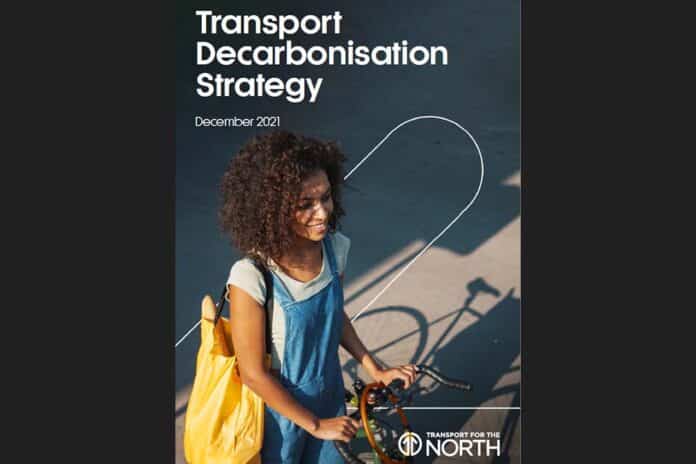Transport for the North (TfN) has released a strategy for cutting carbon emissions from surface transport to near zero by 2045.
The document, called the Transport Decarbonisation Strategy, is being heralded as the first of its kind. TfN says it brings the region’s leaders together “with one voice” on how the sector should address the climate challenges ahead, highlights the area’s ambitions to go beyond national policy and targets, and demonstrates the importance of achieving a fair transition to green ways of working.
It aims to put decarbonisation at the heart of transport-related investment decisions and show how regional action can help the North achieve its ambitions.
The strategy got approval by the TfN board on 24 November.
Four priority activities have been agreed upon following consultation on the strategy over the summer. These cover rail electrification; improving public transport, including Northern Powerhouse Rail; developing a zero-emission vehicle charging infrastructure framework; and developing a regional route map for transport decarbonisation.
The broader action plan within the strategy covers:
- Encouraging modal shift towards more sustainable ways of travelling, such as public transport and active travel
- Zero-emission vehicles, including cars, HGVs and buses, with a comprehensive network of charging facilities to support their wider use
- The decarbonisation of the rail network through electrification
- The use of hydrogen and alternative fuel vehicles
- Opportunities for decarbonisation in the freight industry
- Reducing the embodied carbon within new transport infrastructure development
The strategy also utilises TfN’s four Future Travel Scenarios to ensure it is future-proofed for various possible situations.
Martin Tugwell, chief executive at Transport for the North, said: “Tackling the climate emergency is a critical challenge, and the North of England has an important role to play. As outlined in our Transport Decarbonisation Strategy and highlighted by our Members, we believe our region can, and must, take clear and comprehensive action to decarbonise surface transport over the coming years.
“Our regional strategy shows how the North of England can lead the UK in decarbonising our transport system, and we will now take forward those activities at pace and ensure decarbonisation goals underpin all our work. This will embed sustainability within all transport projects and improvements, helping us build a greener North of England.
“Through this regional strategy we demonstrate the real power of TfN’s Members speaking with one voice and putting action behind our words. Together we have set ourselves an ambitious challenge, and it is one we are all fully behind and will work towards as a region with passion and determination.”
Cllr Louise Gittins, interim chair of Transport for the North and Leader of Cheshire West and Chester Council, said: “I am delighted to be launching this Decarbonisation Strategy which sets out the vision for a fundamental re-thinking of Transport throughout the North, to set us on a path to carbon neutrality by 2045.
“Our vision is to see a system where every person and business has access to high quality, accessible and affordable zero carbon transport. Transport plays a huge role in our daily lives, and we are committed to creating a system that provides high quality mobility solutions and addresses long-standing barriers to accessibility.
“Transport for the North will be advocating on behalf of the region, and working with Government to provide strategic leadership and support for the delivery of an integrated and sustainable transport system. This Decarbonisation Strategy sets out goals and the opportunities which will be progressed in order to achieve those goals over the lifetime of the strategy.
“Recent severe weather events remind us of the critical importance of not only decarbonising transport, but also adapting to the effects to ensure we create resilient systems that are fit for the future. Above all, they remind us of the effects on people whose lives are affected when infrastructure and transport options are not resilient, this underlines the importance of maximising our efforts in both reducing emissions and adapting to climate change, and I am pleased that this strategy equips us with the framework to do so.”
Industry response
The Railway Industry Association (RIA), the national trade body for the rail supply chain, has responded to the new strategy.
Justin Moss, chair of RIA North, said: “The ambition in Transport for the North’s (TfN) Decarbonisation Strategy is welcome. If we are to reach a Net Zero transport system, rail will play a key role providing clean transport options, but we will also need to decarbonise further and increase capacity. That means getting on with electrifying our railways today, including all major routes between the towns and cities in the North.
“The news that the Government has committed to electrification, including from Bolton to Wigan and on the Transpennine Route and Midland Mainline, is a good start. But as an industry we need to see a rolling programme of electrification that ensures we can reach Net Zero targets. Alongside hydrogen and battery power, electric trains will drive a greener railway and better passenger experience, whilst supporting new jobs and investment both in the North and right across UK.
“The industry stands ready to support TfN and the Government’s ambition to reach a Net Zero transport system. We will continue to work with partners to achieve this, as well as provide supplier input into how the North’s railways can be decarbonised.”







































 0113 2082620
0113 2082620 info@railbusinessdaily.com
info@railbusinessdaily.com 15 Mariner Court, Wakefield WF4 3FL
15 Mariner Court, Wakefield WF4 3FL

